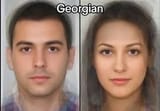Search Results
7/3/2025, 1:25:09 AM
>>17810114
>CHG
>Churkas
The people with the most CHG are the Georgians, whose lands were called Iberia, from which the name of the shithole you lives probably shares the same root word.
>Jones et al. (2015) analyzed genomes from males from western Georgia, in the Caucasus, from the Late Upper Palaeolithic (13,300 years old) and the Mesolithic (9,700 years old). These two males carried Y-DNA haplogroup: J* and J2a, later refined to J1-FT34521, and J2-Y12379*, and mitochondrial haplogroups of K3 and H13c, respectively. Their genomes showed that a continued mixture of the Caucasians with Middle Eastern populations took place up to 25,000 years ago, when the coldest period in the last Ice Age started
>CHG ancestry was also found in an Upper Palaeolithic specimen from Satsurblia cave (dated c.11000 BC), and in a Mesolithic one from Kotias Klde cave, in western Georgia (dated c.7700 BC). The Satsurblia individual is closest to modern populations from the South Caucasus
>As for the Iberian Peninsula, they most often refer to the Ebro River – called Iberos in Greek and Hiberus in Latin (Polybius mentions that the local name is Iber). There are theories about the Basque words ibar (valley) and ibai (river), but there is no conclusive evidence that the name of the Ebro River is derived from these words
>In the case of Iberia, which was later in Georgia, the name probably derives from Armenian words related to words from the Kartvelian languages, or from Colchid terms describing the territories lying “on the other side” of the Lichske Mountains (in relation to Colchis)
>Already ancient writers deduced the mutual kinship of peoples from both regions. According to them, the patriarch Tubal founded the Iberian Kingdom from Caucasus, and from there he moved into the west founding in Spain the Western Iberian Kingdom
>CHG
>Churkas
The people with the most CHG are the Georgians, whose lands were called Iberia, from which the name of the shithole you lives probably shares the same root word.
>Jones et al. (2015) analyzed genomes from males from western Georgia, in the Caucasus, from the Late Upper Palaeolithic (13,300 years old) and the Mesolithic (9,700 years old). These two males carried Y-DNA haplogroup: J* and J2a, later refined to J1-FT34521, and J2-Y12379*, and mitochondrial haplogroups of K3 and H13c, respectively. Their genomes showed that a continued mixture of the Caucasians with Middle Eastern populations took place up to 25,000 years ago, when the coldest period in the last Ice Age started
>CHG ancestry was also found in an Upper Palaeolithic specimen from Satsurblia cave (dated c.11000 BC), and in a Mesolithic one from Kotias Klde cave, in western Georgia (dated c.7700 BC). The Satsurblia individual is closest to modern populations from the South Caucasus
>As for the Iberian Peninsula, they most often refer to the Ebro River – called Iberos in Greek and Hiberus in Latin (Polybius mentions that the local name is Iber). There are theories about the Basque words ibar (valley) and ibai (river), but there is no conclusive evidence that the name of the Ebro River is derived from these words
>In the case of Iberia, which was later in Georgia, the name probably derives from Armenian words related to words from the Kartvelian languages, or from Colchid terms describing the territories lying “on the other side” of the Lichske Mountains (in relation to Colchis)
>Already ancient writers deduced the mutual kinship of peoples from both regions. According to them, the patriarch Tubal founded the Iberian Kingdom from Caucasus, and from there he moved into the west founding in Spain the Western Iberian Kingdom
Page 1
